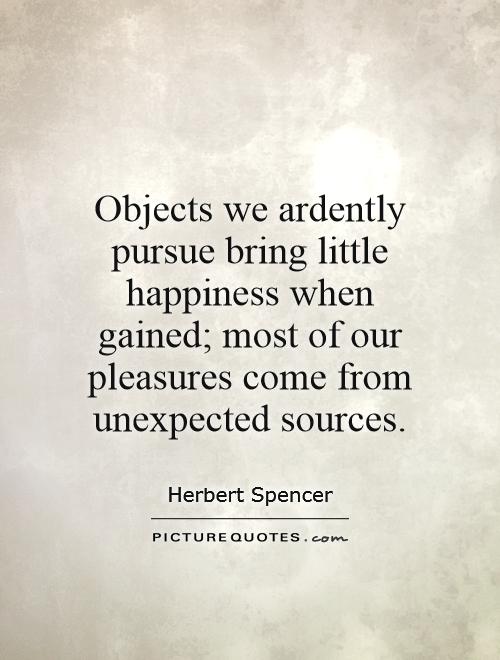Objects we ardently pursue bring little happiness when gained; most of our pleasures come from unexpected sources

Objects we ardently pursue bring little happiness when gained; most of our pleasures come from unexpected sources
Herbert Spencer, a prominent philosopher and sociologist of the 19th century, believed in the idea that the pursuit of material objects does not necessarily lead to true happiness. In his works, Spencer often emphasized the importance of seeking fulfillment and contentment from within, rather than relying on external possessions for satisfaction. This notion is reflected in the quote, "Objects we ardently pursue bring little happiness when gained; most of our pleasures come from unexpected sources."Spencer's philosophy can be seen as a critique of consumerism and the relentless pursuit of wealth and material possessions. He believed that true happiness and fulfillment could not be found in the accumulation of material goods, but rather in the pursuit of knowledge, personal growth, and meaningful relationships. According to Spencer, the pursuit of material objects may bring temporary pleasure, but it is ultimately fleeting and does not lead to lasting happiness.
Spencer's emphasis on finding pleasure in unexpected sources can be seen as a call to embrace the unpredictability of life and to be open to new experiences and opportunities. He believed that true happiness comes from being present in the moment and appreciating the beauty and wonder of the world around us. By being open to unexpected sources of pleasure, we can find joy in the simple things in life and cultivate a sense of gratitude and appreciation for the world around us.












 Friendship Quotes
Friendship Quotes Love Quotes
Love Quotes Life Quotes
Life Quotes Funny Quotes
Funny Quotes Motivational Quotes
Motivational Quotes Inspirational Quotes
Inspirational Quotes